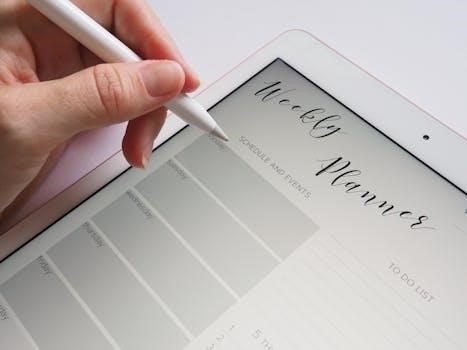Productivity, at its core, is about maximizing output with the resources available. This involves boosting efficiency and doing more of what you love. Essentially, we aim to achieve a greater output relative to the input.
Defining Productivity
Productivity is often viewed as a simple concept, but it encompasses various dimensions. It is essentially the measurement of output against input. This means that to be productive, you must aim to increase your output while optimizing your input, whether that’s time, energy, or resources. It’s not just about doing more; it’s about doing more of the right things efficiently. True productivity involves focusing on your mind, body, and spirit, ensuring that you work smarter not harder. It is the ability to consistently manage your tasks, time, and energy to achieve desired outcomes. It’s a balance between being effective and efficient. A productive person is not always busy; they are focused on what matters, which allows them to achieve more with less wasted effort.

Key Strategies for Enhanced Productivity
To enhance productivity, implement effective time management, prioritize tasks strategically, and set clear, achievable goals. These strategies are crucial for maximizing your efficiency and output.
Time Management Techniques
Effective time management is crucial for boosting productivity. Start by using a calendar to schedule tasks and appointments, which is surprisingly underrated. Avoid waiting for perfect conditions to start; the time is now. Consider checking emails in the afternoon to protect your peak focus hours. Minimize decision fatigue by preparing the night before. Concentrate on important tasks early in the day when energy is high. Remember to say no to requests that don’t align with your priorities; practice this beforehand. These techniques will allow you to take charge of your day, manage your time, and lead a more productive lifestyle. These methods are foundational to working smarter, not harder.
Prioritization Methods
Prioritizing tasks is essential for effective productivity. To begin, identify your most important goals and focus on those first. Avoid the trap of responding to every request immediately; saying no is a powerful tool. Use a practical priority guide to help you take charge of your day. Consider the impact of each task and allocate your time accordingly. If you are overwhelmed by a multitude of requests, learn to assess and prioritize them effectively. Do not fall into the habit of saying yes to everything. Determine what truly needs your attention and what can be delegated or eliminated. Learning how to prioritize is a key aspect of effective time management.
Goal Setting and Planning
Setting clear and achievable goals is a cornerstone of productivity. Define what you want to accomplish, and then break down larger objectives into smaller, manageable steps. Planning is essential and provides a roadmap for your actions, ensuring you are working towards a specific target. Remember to set goals that are realistic and achievable. Develop a step-by-step plan to guide your journey, making it easier to track progress. Avoid waiting for perfect conditions; the time to start is now. Set goals and then take action. Effective planning involves organizing your tasks and ensuring you are working efficiently towards your objectives.

Practical Tips for Boosting Efficiency
To boost efficiency, consider minimizing distractions, prioritizing self-care, and implementing effective task management. These strategies help optimize your work process and lead to greater productivity and success.
Minimizing Distractions
In our hyper-connected world, distractions are everywhere, constantly vying for our attention, and significantly reducing our productivity. To combat this, it’s essential to create a focused work environment. Start by identifying your primary distractions, which could include social media notifications, email alerts, or even a cluttered workspace. Once identified, implement strategies to minimize their impact. Consider turning off unnecessary notifications, closing extra tabs on your computer, and designating specific times for checking emails. A tidy workspace can also contribute to a calmer, less distracting environment. Utilizing website blockers or apps that limit access to distracting sites during work hours can prove beneficial. Remember, maintaining focus is key to accomplishing tasks efficiently and ensuring that you work smarter, not just harder. Additionally, informing colleagues or family members of your need for uninterrupted time will also create a much needed space for concentration. By actively minimizing distractions, you reclaim your attention, and optimize your productivity.
The Importance of Self-Care
Self-care is not a luxury; it is a fundamental component of sustained productivity and overall well-being. When we prioritize our physical and mental health, we are better equipped to handle challenges and perform at our best. Engaging in regular physical activity, such as exercise or even a short walk, enhances energy levels and sharpens focus. Adequate sleep is crucial for cognitive function and memory consolidation. A balanced diet fuels both the body and the mind, while practices like mindfulness and meditation reduce stress. Furthermore, practicing self-compassion is vital; acknowledging your efforts and treating yourself with kindness promotes resilience and motivation. Ignoring self-care can lead to burnout, decreased productivity, and even health problems. Therefore, integrating self-care into your daily routine is not just beneficial, it is essential for maintaining long-term productivity and a fulfilling life. Remember that taking care of yourself allows you to work smarter and achieve your goals more efficiently.
Effective Task Management
Effective task management is crucial for boosting productivity and achieving your goals. It involves organizing your tasks in a structured manner, enabling you to prioritize and complete them efficiently. Begin by breaking down large, overwhelming tasks into smaller, more manageable sub-tasks. This makes the overall project less daunting and allows you to see progress more readily. Utilizing tools such as to-do lists, project management software, or even a simple notebook can help you keep track of your tasks and deadlines. Categorizing tasks based on urgency and importance is essential to focus on what matters most. Avoid multitasking as it can lead to decreased efficiency and higher error rates, instead, focus on one task at a time. Regular review and updates are necessary to ensure your system remains effective. Efficient task management also involves setting realistic deadlines, avoiding procrastination, and celebrating your accomplishments along the way.

Mindset and Productivity
A positive mindset is key to achieving higher productivity. Cultivating a growth mindset will help you embrace challenges and see them as opportunities for learning and development.
Cultivating a Growth Mindset
Adopting a growth mindset is crucial for enhancing productivity, as it fosters resilience and a positive approach to challenges. This mindset, as highlighted by Dweck, Ph.D., encourages the belief that abilities and intelligence can be developed through dedication and hard work. Instead of viewing setbacks as failures, individuals with a growth mindset see them as opportunities for learning and growth. This perspective is vital for maintaining motivation and persistence in the face of difficulties, therefore helping you to be more productive. Embracing this philosophy allows you to bounce back from setbacks with renewed energy and enthusiasm, ultimately leading to improved outcomes and a greater sense of accomplishment, fostering a more effective and productive approach to all your tasks and goals.

Tools and Techniques
Implementing effective tools and techniques is key to boosting productivity. These include utilizing calendars, planners, and other methods that help you organize your tasks, manage your time, and maintain focus.
Utilizing Calendars and Planners
Calendars and planners are not just tools for marking dates; they are powerful instruments for enhancing productivity. They provide a visual representation of your schedule, allowing you to allocate time effectively for various tasks and appointments. Using a calendar helps you avoid double-booking and ensures you don’t miss important deadlines. A planner, on the other hand, allows for more detailed task management, enabling you to break down large projects into smaller, more manageable steps. It is a way to track progress, prioritize tasks, and stay organized. Whether you prefer a digital calendar or a physical planner, incorporating these tools can significantly improve your time management skills, leading to increased efficiency. These tools help in structuring your day and weeks, thus allowing you to maximize your time and achieve more, by also being a reminder for upcoming tasks or events. Using these tools makes you more organized and planned.
